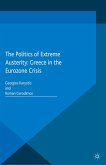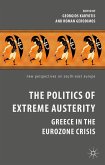This book was prompted by the current, lingering financial crisis, which has its basis in the disorderly financial practices of the United States. These practices have resulted in an accumulated debt which now requires the United States to run financial policies at artificially low interest rates. In principle, these low interest rates should flood the markets with ready money. Since the spread for banks is very thin, however, and they must carefully discriminate between available risks and finance only those propositions with no risk, credit is not abundantly available. With staggering foreign debt and a myriad of other perils looming, this great nation is at peril for sure. In the tradition of the Heilbronn Symposium, the authors look at historical cases as a means of understanding the current situation and informing possible solutions to a problem that continues to affect the global economy. The volume analyzes cases such as Prussia, Greece, Italy, Estonia, and the European Union. This book will be of interest to scholars and students of economic history as well as policy makers who may benefit from an historical understanding of the economic challenges their countries currently face.
Bitte wählen Sie Ihr Anliegen aus.
Rechnungen
Retourenschein anfordern
Bestellstatus
Storno








